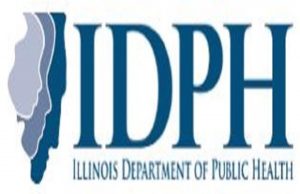SPRINGFIELD – Senate Republican lawmakers are working to put citizens back in the driver’s seat of their democracy through the Voter Empowerment Project, a series of constitutional amendments to fix the state’s broken redistricting system, and allow voters to weigh in on new laws, throw out corrupt politicians, and make substantive changes to the Illinois Constitution through popular referendums.
Meanwhile, the Pritzker Administration is still refusing to tell the public how much they paid in fraudulent unemployment claims during the pandemic.
A new study shows that schools are still struggling to find qualified teachers, and the problem is getting worse.
On the COVID-19 front, the state has launched a new centralized contact-tracing program.
Returning Power to Voters
 Illinois voters have had their voices repeatedly ignored and diminished by lawmakers and Governors from the supermajority party. Popular referendums have been shut down in court, efforts to establish redistricting reforms have been blocked, and sweeping changes to laws have been pushed through in the middle of the night with little to no transparency.
Illinois voters have had their voices repeatedly ignored and diminished by lawmakers and Governors from the supermajority party. Popular referendums have been shut down in court, efforts to establish redistricting reforms have been blocked, and sweeping changes to laws have been pushed through in the middle of the night with little to no transparency.
Members of the Senate Republican Caucus, however, are working to put the power back in the hands of Illinoisans. The Voter Empowerment Project proposes several constitutional amendments to allow citizens to take back control of their democracy and hold corrupt politicians accountable.
Unveiled by Senate Republican Leader Dan McConchie (Hawthorn Woods) earlier this week, the package of legislation contains five state constitutional amendments tailored to increase the voice of voters.
SJRCA 13 would help end the practice of partisan gerrymandering in Illinois. During the last year, citizens watched as legislative Democrats rammed through extremely partisan legislative, Congressional, and judicial maps, all swiftly signed into law by Gov. JB Pritzker. The new proposal would take the power out of lawmakers’ hands by creating an independent redistricting commission made up of 17 commissioners – seven Republicans, seven Democrats, and three independents – chosen by the Chief Justice of the Illinois Supreme Court and the most senior Supreme Court Justice from the opposite party.
SJRCA 14 is designed to allow citizens to initiate referendums to make substantial changes to the state Constitution. Currently, the Constitution places overly strict limits on what changes can be made by voters, which has stalled many popular referendums, including redistricting reform efforts. The new proposal would give the people of Illinois much more broad authority on what can be changed via referendum, including subjects such as taxes and redistricting.
SJRCA 15 would further enhance the power of popular referendums, and is a direct response to the recent practice of controversial legislation being rammed through by supermajority lawmakers in the middle of the night with little transparency. Many controversial changes, including tax hikes and sweeping criminal justice changes, have been passed by so-called “lame-duck” legislatures, made up of retiring lawmakers and those who have already lost reelection campaigns, who are no longer accountable to voters.
The new proposal would allow citizens to initiate up-or-down referendums on newly-passed laws. This important change would make sure that voters have the final say on what actions lawmakers take, and would provide an important check on a runaway supermajority party.
SJRCA 16 would provide a mechanism to recall many corrupt state and local elected officials. Illinois voters, more so than the residents of most states, have repeatedly witnessed reports of wrongdoing by their elected representatives, from ethics convictions to bribery and even theft of public funds. Under current law, only the Governor of Illinois may be recalled by citizens, and restrictions in place make it all but impossible to undertake. The new proposal would provide a reasonable system, with moderate requirements, for the recall process, and would expand it to state constitutional officers, legislative leaders, members of the General Assembly, and local government officials.
State Sen. Jil Tracy (R-Quincy) said she believes that the Voter Empowerment Project is a desperately needed step to undo years of elected officials ignoring the will of the people. These Constitutional amendments would finally put the citizens back in the driver’s seat to hold their elected officials, especially corrupt politicians, accountable.
Administration Still Mum on Unemployment Fraud
 Illinoisans still do not know how much the state paid out in fraudulent unemployment assistance claims during the pandemic. The Pritzker Administration has yet to release any totals and isn’t offering a timeline for when the data will be made available.
Illinoisans still do not know how much the state paid out in fraudulent unemployment assistance claims during the pandemic. The Pritzker Administration has yet to release any totals and isn’t offering a timeline for when the data will be made available.
A recent report from the Illinois Auditor General indicated that the $155 million in potentially improper payments were made during just the first few weeks of the pandemic.
According to a recent article from “The Center Square,” United States Department of Labor data indicate that the state’s fraud rate was 8.4 percent of a total of $5.1 billion paid, indicating that the total over the covered period was in the range of $430 million.
Sen. Tracy said it is extremely disappointing that fraud was apparently so rampant in the Pritzker Administration’s unemployment system. She added that is unacceptable that the Pritzker Administration is still refusing to release accurate data on the extent of COVID-19 related unemployment fraud.
In September, Republican lawmakers helped push through resolutions directing the Illinois Auditor General to perform full audits of the state’s Pandemic Unemployment Assistance (PUA) and Business Interruption Grant (BIG) programs.
Statewide Teacher Shortage Getting Worse
 Illinois has been facing a shortage of teachers for several years, and the problem is getting worse.
Illinois has been facing a shortage of teachers for several years, and the problem is getting worse.
According to a recent study by the Illinois Association of Regional Superintendents of Schools, 88 percent of schools districts reported problems with teacher shortages, with 77 percent of them saying that the problem is getting worse. Substitute teachers are apparently even harder to find, with 96 percent of superintendents reporting issues with finding substitutes.
A new driver of the crisis has been educator burnout due to COVID-19 related issues. Forty-nine percent of superintendents said that COVID-19 has increased teacher turnover in their schools.
According to the study, the shortage has led to more than 400 classes being cancelled, and more than 300 being online, due to the inability to find qualified teachers. Approximately 2,000 teaching positions are currently either unfilled or filled by someone not qualified.
Sen. Tracy said she will continue to work with educators to find solutions to address these shortages.
New Statewide Contact Tracing System
 Illinois residents who have tested positive for COVID-19 have likely received a phone call from their local health departments. Moving forward, they should instead expect text messages from the Illinois Department of Public Health (IDPH).
Illinois residents who have tested positive for COVID-19 have likely received a phone call from their local health departments. Moving forward, they should instead expect text messages from the Illinois Department of Public Health (IDPH).
Citing the ongoing COVID-19 surge, IDPH has reorganized its contact tracing protocols, including taking over the burden of initial contact for positive cases. Since Jan. 14, all positive cases now go through a centralized system that automatically sends text messages and is supposed to prioritize higher-risk groups.
The text will contain a link (bit.ly/IDPHtracing) and a phone number (312-777-1999), asking residents to contact the agency.
